Public Health News
Ryan Patel’s journey of discovery
Public Health senior Ryan Patel was the focus of Syracuse University’s “Be Orange” campaign this Spring 2019. Ryan is a double major—a B.S. in public health and a B.A.in biology—and a dedicated student ambassador with his sights set on medical school. As a University 100 Student Ambassador, Forever Orange Student Alumni Council (FOSAC) member, and volunteer for Syracuse’s Veterans Administration Medical Center, Crouse Hospital’s Emergency Department, Syracuse City School District’s Refugee Assistance program and Vera House, Ryan’s life at Syracuse University has been busy and full yet richly fulfilling.
Ryan mentions having a transformative Syracuse University Abroad experience in South Africa, where he took part in a public health project educating local teenagers about drug abuse. “Syracuse drew out so many of my passions and gave me outlets, creative spaces, programs and other opportunities to express them,“ he says. “It has led me down pathways I never expected.”
Ryan genuinely loves the culture he has found at Syracuse, and says it inspires him to push as hard as he can to achieve his dream of becoming an emergency room physician. “I am grateful for all the privileges and opportunities I’ve had here.”
Interested in learning more about Public Health and the exciting careers and opportunities available? View our public health academic programs page for more information.
2019 Falk Student Research Celebration Takes Place March 26-29
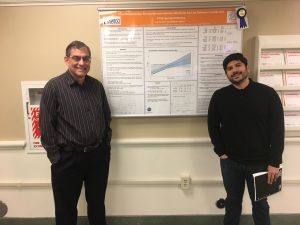
Falk students are invited to submit posters for completed or in-progress empirical, exploratory, policy analytic or hypothesis-driven research projects using qualitative, quantitative, or mixed methods for display, judging, and awards in the 2019 Falk Student Research Celebration March 26-29. The multi-day event will highlight Falk students’ research collaborations and their dedication to advancing research knowledge.
Poster entry forms are due March 7 and poster submissions are due March 21. Posters will be on display beginning March 26 near the second floor student lounge and the Falk Café on 2 in the Falk Complex, with judging and awards taking place March 27. Students will present their posters from 12 to 1 p.m. on March 27 and 28.
The Falk College Office of Research Development promotes a robust, collaborative research community in which students play an active role. At Falk, graduate and undergraduate students have the opportunity to work directly with faculty to collect data, analyze findings and draw conclusions on relevant topics surrounding public health, food studies, nutrition, sport management, human development and family science, social work, and marriage and family therapy.
“Conducting research as a student has many benefits, including building a strong relationship with Falk faculty members, improving writing and statistical analysis skills, and creating connections both on and off campus,” says instructor Jessica L. Garay. “Because much of the research in Falk College has real-world implications, we want students to be able to share their findings publicly, and the Falk Student Research Celebration is the perfect opportunity to do so.”
“The student research days is a great showcase of the work our students are doing to understand the world and the human condition,” says assistant professor David Larsen. “It’s always fun to see the new ideas that our students have, and how they are seeking to improve the world we live in.”
Assistant professor Bhavneet Walia agrees. “It’s a great way to quench your curiosity,” she says. “Come see what our students are up to at the Falk Student Research Celebration.”
Winners of the 2018 Falk Student Research Celebration, held March 27-30, 2018, included research in a wide range of topics, such as maternal health, accessibility, and PTSD.
For more information about the 2019 Falk Student Research Celebration, contact Amy Dumas adumas@syr.edu at the Falk College Office of Research Development.
Research training program for veterans now accepting applications
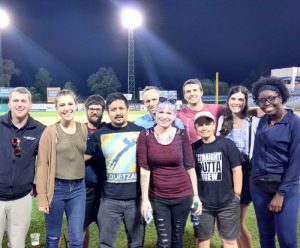
To improve access to undergraduate research experiences in the area of trauma for groups typically underrepresented in this research, including veterans, a collaborative venture between Syracuse University’s Falk College, SUNY Oswego, and SUNY Upstate Medical University is now recruiting students for its 2019 program May 20-June 27, 2019 on the Syracuse campus.
The Undergraduate Trauma Research Training program is a National Science Foundation (NSF) Research Education for Undergraduates (REU) opportunity directed by Brooks B. Gump, Ph.D., MPH, Falk Family Endowed Professor of Public Health, and co-directed by Karen Wolford, Ph.D., Professor Department of Psychology and Coordinator of the Interdisciplinary Graduate Certificate Program in Trauma Studies at SUNY Oswego and includes other faculty from these institutions as well as SUNY Upstate Medical University. This program brings together veterans and non-veterans in a safe environment to pursue trauma research activities.
This six-week immersion program involves coursework, mentored student-faculty interactions, and the development of a research project. Participating students receive a $3,000 stipend for attending the summer session. Room and board are provided free of charge, as needed.
Ten student-veterans and traditional students completed the 2018 Undergraduate Trauma Research Training program, where they attended seminars on research methods and statistics, neurobiological, psychological, and physiological aspects of trauma, and research ethics as well as weekly self-care lessons and graduate school application workshops.
The program, now in its eighth year, draws on personal experiences of veterans who understand the nature and context of traumatic events. By gaining a scientific understanding of trauma, students who complete the program gain essential tools they can use to improve the quality of life for themselves and others, including veterans. Read more about one REU participant’s experience here.
The program is purposefully structured to span one full year. Following the summer program, students continue their research under the mentorship of REU faculty during the Fall semester. Finally, students are expected to present their research at a national conference in Spring, 2020. The travel and registration expense for the conference is provided to the student through this program.
For more information about the program, and to submit application for it, visit the Syracuse University REU website or contact Ivan Castro at iecastro@syr.edu. The application deadline is March 1, 2019.
Falk researchers measure effect of dog ownership, training on PTSD symptoms among veterans

Falk College faculty in public health and social work are researchers in a new integrative health study that measures the effects of owning and training a therapy dog on posttraumatic stress disorder (PTSD) in veterans. Published in The Journal of Alternative and Complementary Medicine, “Dog Ownership and Training Reduces Post-Traumatic Stress Symptoms and Increases Self-Compassion Among Veterans: Results of a Longitudinal Control Study” is coauthored by Dessa Bergen-Cico, Ph.D., Yvonne Smith, Ph.D., Collin Gooley, and Brooks Gump, Ph.D. at Syracuse University; Karen Wolford, Ph.D. at SUNY Oswego, and; Kathleen Hannon, Ryan Woodruff, and Melissa Spicer, Clear Path for Veterans.
Researchers reported significant reductions in PTSD symptoms, as well as reductions in perceived stress, isolation, and self-judgement, and significant increases in self-compassion when comparing the veterans that participated in the Dogs2Vets program over a 12-month period to veterans that were on the waiting list to receive a dog during that time period.
“The short story here is that dogs may be the best friend for a veteran with PTSD who engages in this training program,” says JACM Editor-in-Chief John Weeks. “It is remarkable when research suggests that the best medicine for such a gnawing condition may be as close at hand and simple as this.”
College Of Law, Falk College provide legal support to local community
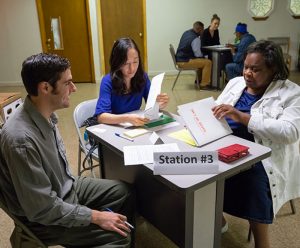
“Advance planning for medical decisions and preferences is never an easy conversation to have with loved ones, but it is a necessary and responsible thing to do,” explains Cowart. “The students from the College of Law, under Professor McNeal’s leadership, filled a significant void within our community.”
Research estimates that only one in three Americans has an advance directive, a number that is substantially lower among communities of color, those of lower socio-economic status, and lower levels of education. This semester, College of Law students in McNeal’s Advance Directives in the Community course and Elder and Health Law Clinic (EHLC) gained hands-on experience educating local residents about the importance of planning for end-of-life care while helping them prepare advance directives in partnership with Falk College.
“Advance directives enable people to appoint a proxy to make decisions when they are no longer able to, and they lay out a person’s preferences for the care they want,” says McNeal. Providing general practice legal assistance for those aged 60 and over with low or moderate incomes, the EHLC offers students the opportunity to represent clients with faculty guidance and oversight.
New public health faculty bring variety of expertise to classrooms, research
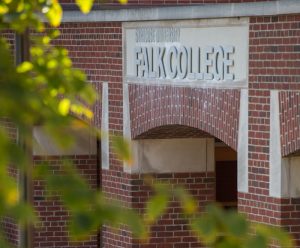 Falk College’s newest public health faculty, Bryce Hruska, Bhavneet Walia, and Najah Zaaeed, bring a variety of research interests and specializations to the program, including stress, health economics, and
Falk College’s newest public health faculty, Bryce Hruska, Bhavneet Walia, and Najah Zaaeed, bring a variety of research interests and specializations to the program, including stress, health economics, and
Bryce Hruska, Ph.D. is an assistant professor in the public health program where he has served as a research assistant professor, postdoctoral researcher, and project manager. He specializes in traumatic events, posttraumatic stress disorder (PTSD), stress and health, occupational stress, recovery experiences, and quantitative methods.
Hruska’s research focuses on better understanding how psychological stress “gets under the skin” to impact physical health. Since coming to Falk College, his work has primarily consisted of overseeing the operations of two research projects: “Environmental Toxicants, Race, and Cardiovascular Disease Risk in Children” and “The Psychosocial and Physiological Consequences of Taking and Not Taking Time Off from Work.” He has most recently published in the Journal of Substance Abuse Treatment, Headache: The Journal of Head and Face Pain, as well as Environmental Research, Psychology of Addictive Behaviors, and Social Science and Medicine, among others.
Bhavneet Walia, Ph.D., an assistant professor, joined Syracuse University in 2015 from Western Illinois University where she was an associate professor of decision sciences and founding director of the business analytics post-baccalaureate certificate program. Her fields of specialization include health economics and health econometrics.
Walia’s present research efforts are focused in three areas: early child health interventions and cognitive development; mortality and behavioral effects of chronic traumatic encephalopathy and related neurodegenerative diseases; and markets for health care in the United States. Her research and scholarship include 14 peer-reviewed journal articles that have appeared in leading journals of applied economics, health policy, and environmental policy: the American Journal of Economics & Sociology, the Journal of Economic Education, and the Southern Economic Journal, and two in Renewable Agriculture & Food Systems, Economics Letters.
Najah Zaaeed, Dr.PH. is an assistant teaching professor in the public health program. Since 2016, Zaaeed has taught as an adjunct professor in public health at Syracuse University and at SUNY Oswego. She specializes in global health and mental health, health education and promotion, social media and health outcomes, addiction and wellness, gerontology, disability studies, maternal and child health, and refugee health and social service needs
Zaaeed’s research interests are in aging with intellectual and developmental disabilities, maternal and child health, effectiveness of ecological models for health awareness at global levels, and refugee health. Zaaeed authored a chapter in the book Refugee Education: International Perspectives from Higher Education and NGOs. She is also published in the International Journal of Physical Medicine and Rehabilitation and the Journal of Refugee and Global Health and has presented at the North American Refugees Health Conference.
Learn more about public health academic programs
Learn about Falk College faculty
Intelligent Lives film screening highlights inclusion in Falk College classrooms, research
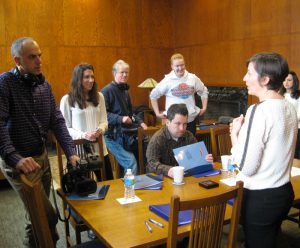
“When the film, Intelligent Lives is featured as part of the 2018 Syracuse International Film Festival’s Imaging Disability showcase October 14, the audience will see how Falk College classrooms and programs are incredible places of inclusion for students with intellectual disability,” says professor of public health and faculty fellow at the Burton Blatt Institute, Katherine McDonald. The film explores how segregation of people with intellectual disability became the norm, why this segregation is slowly being dismantled, and how some people with intellectual disability are blazing a bold new path, including Micah Fialka-Feldman ’15.
In 2013, McDonald received a grant from the Eunice Kennedy Shriver National Institute of Child Health and Human Development, a part of the National Institutes of Health (NIH), to address the pressing need for scientific knowledge to improve the health of persons with intellectual disability for the study, “Project ETHICS.”
During the study, an expert panel created a survey administered to over 500 people across the U.S. to learn about their views on doing research with adults with an intellectual disability. One of the panel members was Fialka-Feldman, a then-Syracuse University student and teaching assistant, who is now a staff member in the School of Education where he teaches and works on projects in the Taishoff Center as well as McDonald’s Community4All Project. Fialka-Feldman, who graduated in May 2015 with a certificate in Disability Studies, helped design the Project ETHICS survey and assisted with recruitment and sharing findings.
During the project, McDonald was contacted by Emmy-nominated documentary filmmaker, Dan Habib from the Institute on Disability (UCEDD) at the University of New Hampshire. He was appointed by President Barack Obama to the President’s Committee for People with Intellectual Disabilities (PCPID) in 2014. Fialka-Feldman also served on the PCPID.
Habib filmed Fialka-Feldman participating in Project ETHICS work at Syracuse University and in public health classes in Falk College in 2016. During multiple site visits to campus, Habib and his team spent time with Fialka-Feldman, his friends and colleagues to capture Micah’s vibrant academic, work and social life. The visits included filming Micah at home, working at the SU School of Education, attending his public health class taught by assistant dean of student services and public health professor, Jim Byrne, and working as part of the Expert Panel on research findings in Project ETHICS with McDonald.
“Having Micah in a class of 100 students was a privilege. He participated in all aspects of the class and shared his life experience in the class and during exams. Micah’s insights about topics in the personal and social health class were thought provoking for the class and for me,” notes Byrne.
“Project ETHICS is community-engaged research. The film is about expanding ideas of intelligence – community-engaged research draws from similar ideas. Rather than trained scientists controlling research, we work hand-in-hand with community members who have lived experience and draw from their expertise to create research questions, methods, dissemination, and action to follow. This way of working legitimizes the value of lived experience, and emphasizes that a broad array of stakeholders can—and should—contribute to research,” explains McDonald, principal investigator for the study.
Since 2016, numerous research articles about Project ETHICS have been published, on which Fialka-Feldman is co-author. “This film is a key component to challenging dominant cultural narratives about people labeled with intellectual disability. We need films that reflect disability rights, and showcase people with disability leading meaningful lives as caring, capable citizens” says McDonald.
The Intelligent Lives screening will take place on Sunday, October 14 at 3:00 p.m. in Shemin Auditorium, Shaffer Art Building. The film is captioned; ASL interpretation and CART will be provided for the introduction and discussion. Watch the trailer of the film.
Throughout the month of October, the Disability Cultural Center (DCC) and a host of campus partners and student organizations will host Disability Awareness and Appreciation Month. The month’s events will focus on disability and its many intersections. For more information, visit the Syracuse University story.
Falk College welcomes new faculty and staff
 Syracuse University’s Falk College is pleased to announce the appointment of new staff members who have joined Falk College in the past academic year, including Nikki Beckwith, director of dietetic internship program, Trinity Benton, kitchen technician, and Deana Hansen-Danis, procurement coordinator in the Department of Public Health, Food Studies, and Nutrition; Bradford Ducre, computer consultant in information technology, and; Lisa Liparulo, internship placement coordinator in the Department of Sport Management.
Syracuse University’s Falk College is pleased to announce the appointment of new staff members who have joined Falk College in the past academic year, including Nikki Beckwith, director of dietetic internship program, Trinity Benton, kitchen technician, and Deana Hansen-Danis, procurement coordinator in the Department of Public Health, Food Studies, and Nutrition; Bradford Ducre, computer consultant in information technology, and; Lisa Liparulo, internship placement coordinator in the Department of Sport Management.
It also welcomes ten new faculty members, Chaya Charles, Jennifer Genovese, Ryan Heath, Bryce Hruska, Kenneth Marfilius, David Meluni, Jessica L. Garay, Sara Vasilenko, Bhavneet Walia, and Najah Zaaeed.
Chaya Lee Charles, M.S., R.D.N., C.S.G., C.D.N.
Nutrition & Food Studies
Chaya Charles joins the Department of Nutrition & Food Studies as an assistant teaching professor in the nutrition program.
Prior to her appointment as assistant teaching professor, Charles has worked as an adjunct instructor in the Department of Nutrition & Food Studies at Falk College since 2014. In addition, she is currently a consultant dietitian for Sodexo at Menorah Park and senior nutrition consultant for Oswego County Opportunities. She has previously held titles such as outpatient dietitian, clinical dietitian, and nutrition services manager at various health care facilities.
Charles completed both her B.S. degree in nutrition, and her M.S. degree in nutrition science at Syracuse University. Her master’s thesis is titled “Comparing Vegan and Vegetarian Attitudes, Beliefs and Perceptions with Risk for Disordered Eating Behavior.” She is also published in the Journal of the Academy of Nutrition and Dietetics.
Charles is a board-certified specialist in gerontological nutrition, a registered instructor for the National Restaurant Association’s ManageFirst Program courses, ServSafe certified, and certified in food and beverage cost control. She is the recipient of the 2014 Sodexo Clinical Innovation Award, 2011 Sodexo Northeast Regional Dietitian of the Year, and winner of the 2010 National Sodexo Nutrition Outcomes Study.
Areas of specialization: Vegetarianism and disordered eating behaviors, malnutrition prevention in the elderly, cardiovascular and diabetic nutrition counseling, nutritional intervention for wound healing, weight loss counseling, meal planning guidance and the provision of nutritious menus in institutional and home settings.
Jennifer Cornish Genovese, A.C.S.W., Ph.D.
School of Social Work
Jennifer Cornish Genovese joins Syracuse University’s Falk College as an assistant teaching professor in the School of Social Work. She has previously taught in the College’s Department of Human Development and Family Science and in the School of Social Work, including courses such as Power, Conflict, & Violence in the Family; Interpersonal Competence; Family Systems Theory; Advanced Practice with Individuals, Families, and Groups; and Practice with Children, Adolescents, and Families.
Genovese is a NYS Licensed Certified Social Worker and has worked in private practice as a psychotherapist for 30 years. She specializes in the treatment of abused children and adolescents. She is a clinical consultant for the NYS Department of Social Services and facilitates monthly support groups on secondary traumatic stress of child welfare workers in multiple Central New York counties. She is also a program and ministry consultant for the Bishop of the Evangelical Lutheran Church Upstate NY Synod.
Genovese has presented for the National Association of Social Workers (NASW) Professional Symposium in Chicago, IL and for NASW’s Annual Meeting. She was previously employed by St. Joseph’s Hospital Health Center as the outpatient clinic manager of the Mental Health Services Department. Genovese formerly served on the board of directors for Girls Inc. and the Mohawk Valley Committee for the Prevention of Child Abuse and Neglect. She was the co-host of two long-running radio programs in Syracuse, NY: Teen Talk on 93Q FM and Parenting Matters on 570 AM and 88 WAER FM.
Genovese completed a Ph.D. in child and family studies and M.S.W. at Syracuse University’s Falk College, as well as a B.A. in sociology from the State University of New York College at Cortland.
Areas of specialization: Assessment and treatment of physically and sexually abused children and adolescents, treatment of bereavement, loss and trauma in children, adolescents, and identification and intervention of secondary traumatic stress of child welfare workers.
Ryan D. Heath, M.A, L.C.S.W., Ph.D.
School of Social Work
Ryan Heath joins the School of Social Work as an assistant professor. Heath’s research seeks to understand how out-of-school programs (e.g., extracurricular, afterschool and summer programs) promote the social-emotional development of low-income youth, students of color, and other historically marginalized youth. To improve the reach, quality, and impact of these programs, his work aims to elucidate how extracurricular programs interface with other social-ecological contexts that affect youth, such as schools, peers and families, and to identify the potential mechanisms through which extracurricular programs influence youth’s social-emotional development and educational attainment. He has been involved in several research projects, most recently as a collaborator on the “Becoming Effective Learners—Out-of-School Time Study” with The Consortium for School Research at the University of Chicago. Heath has published in Youth & Society, Urban Review, Urban Education, LGBT Health, and Pediatric Research. He is also co-author of the research report, Foundations of Young Adult Success: A Developmental Framework.
Prior to joining Syracuse University, Heath taught classes on research methods and cognitive-behavioral therapy at the School of Social Service Administration at the University of Chicago. As a clinical social worker, Heath has implemented cognitive-behavioral interventions with adolescents and youth groups in both school-based and community settings. He previously worked as a clinical director for Chicago Adventure Therapy, as a school-based therapist at UCAN, as a therapeutic learning coach for Project EDGE of OMNI Youth Services, and as a teen outreach program coordinator at Health Quarters.
Heath earned a master’s degree in clinical social work and a Ph.D. from the University of Chicago School of Social Service Administration. As a doctoral student, Heath received a pre-doctoral fellowship from the Institute of Education Sciences and the University of Chicago Committee on Education, and completed a graduate certificate in interdisciplinary education sciences. He completed a bachelor’s degree in science with honors from Brown University.
Areas of specialization: Adolescent development, extracurricular and out-of-school programs, social-emotional learning, educational attainment, youth social services, school and community partnerships.
Bryce Hruska, Ph.D.
Public Health
Bryce Hruska is an assistant professor in the Falk College public health program where he has served as a research assistant professor, postdoctoral researcher, and project manager for the public health program. He was previously a postdoctoral fellow at the Vermont Center on Behavior and Health.
Hruska’s research focuses on better understanding how psychological stress “gets under the skin” to impact physical health. Since coming to Falk College, his work has primarily consisted of overseeing the operations of two research projects: “Environmental Toxicants, Race, and Cardiovascular Disease Risk in Children” and “The Psychosocial and Physiological Consequences of Taking and Not Taking Time Off from Work.”
He has most recently published in the Journal of Substance Abuse Treatment, Headache: The Journal of Head and Face Pain, as well as Environmental Research, Psychology of Addictive Behaviors, and Social Science and Medicine, among others. He has published book chapters in the Handbook of Cardiovascular Behavioral Medicine and in Trauma and Substance Abuse: Causes, Consequences, and Treatment of Comorbid Disorders, Second Edition.
Hruska has presented his research at conferences including the International Society for Traumatic Stress Studies, the American Psychosomatic Society, and the College on Problems of Drug Dependence. He has made multiple media appearances promoting the research that he and his collaborators are performing, and he serves as an invited reviewer for a number of peer-reviewed journals including the Journal of Traumatic Stress, Journal of Anxiety Disorders, Stress and Health, Addictive Behaviors, and Journal of Psychoactive Drugs.
Hruska earned an M.A. and Ph.D. in experimental psychology, with concentrations in health psychology and quantitative methods, both from Kent State University. He earned a bachelor’s degree in psychology from the University of Akron.
Areas of specialization: Traumatic events, posttraumatic stress disorder (PTSD), stress and health, occupational stress, recovery experiences, quantitative methods.
Kenneth James Marfilius III, L.C.S.W., D.S.W.
School of Social Work
Kenneth Marfilius joins Falk College as a visiting teaching professor in the School of Social Work.
While active duty, Marfilius served in the U.S. Air Force Biomedical Science Corps in multiple roles: active duty clinical social worker, mental health therapist, family advocacy officer in charge, and as manager of the alcohol and drug prevention and treatment program. He was commissioned in 2013 and was discharged in 2016 having obtained the rank of captain. At the Barksdale Air Force Base, Marfilius served in a variety of mental health roles related to sexual assault prevention and response, suicide prevention, and traumatic stress. Marfilius has also worked for the U.S. Department of Veteran Affairs at the Syracuse VA Medical Center in the Healthcare for Homeless Veterans Program, and as a disruptive behavior committee member.
Marfilius previously taught courses such as Social Work Practice in Mental Health and Introduction to Military Culture and Social Work Practice, as well as guest and continuing education lectures at Falk College, and has presented for the Supportive Services for Veterans and Families (SSVF) and at the Association for Humanistic Counseling National Conference. He recently guest lectured at the University of Pennsylvania on “Trauma— Informed Care, Housing First, and Critical Time Intervention for Veteran Homelessness.”
Marfilius is honored with a National Defense Service Medal, Global War on Terrorism Service Medal, and Nuclear Deterrence Operations Service Medal. He is a recipient of the U.S. Air Force Health Professions Scholarship and the U.S. Air Force Outstanding Unit Award and has twice been awarded the Barksdale Air Force Base Medical Operations Squadron Company Grade Officer of the Quarter.
Marfilius earned a doctorate in clinical social work (D.S.W.) and master of social work (M.S.W.) from the University of Pennsylvania School of Social Policy and Practice, and a bachelor’s degree in psychology with a minor in public health from Syracuse University.
Areas of specialization: Military mental health, military families, veteran social work, homelessness, domestic violence, suicide prevention, substance use prevention and treatment, and military culture and social work practice.
David Meluni, M.S.
Sport Management
David Meluni is a teaching professor in the Department of Sport Management, where he served as an adjunct over the past four years.
Meluni has over 18 years of experience in the sport industry, including two years as vice president of sales and business development for both 805 Stats and Infinity Sports and Entertainment. He also spent five years as the vice president of sales at SIDEARM Sports. In his tenure at SIDEARM, he negotiated and signed agreements with the University of Texas, University of Kansas, the Heisman Trophy, and the Maui Invitational as well as with several Division I, II and III institutions.
He has also worked with the New York Collegiate Baseball League as a member of its executive team. Prior to working in the digital space, the Syracuse native spent 10 years with IMG College, the multi-media rights holder at Syracuse University, where he maintained a client base of over $1.1 million per year.
Meluni serves on the board for the Camillus Softball and Baseball Association, coaches multiple travel teams for the Camillus Wildcats, and is a volunteer assistant coach for the West Genesee varsity baseball team.
Meluni earned a bachelor’s degree from Ithaca College in sport management, where he also acted as captain and NCAA All-Region Infielder for the Bombers’ baseball team. In 1999, he was selected to attend the prestigious NCAA Leadership Conference. He then attended Florida State University as a graduate assistant in the Seminoles’ ticket office and earned a master’s degree in sport administration. He worked as a marketing assistant at FSU, assisting with football, women’s volleyball, men’s basketball, baseball, and softball.
Areas of specialization: Sport sponsorship sales, ticket sales, technology in sport and sports marketing and promotion.
Jessica L. Garay, M.S., R.D.N., F.A.N.D.
Nutrition & Food Studies
Jessica Garay joins the Department of Nutrition & Food Studies as an instructor in the nutrition program.
Previously, Garay worked at Utica College as an assistant professor of biology: physiology & nutrition since 2016. From 2010-2016, she was an adjunct instructor at Syracuse University and has held positions at Onondaga Community College and George Washington University, as well as the Washington Cancer Institute and Food Bank of Central New York.
Garay is published in the European Journal of Applied Physiology, Medicine & Science in Sports and Exercise, the American Journal of Human Biology, and Current Biomarker Findings, among others. She has presented at the International Society of Behavioral Nutrition and Physical Activity Conference and the NYS Academy of Nutrition and Dietetics (NYSAND) Annual Meeting.
Garay is the recipient of a 2016 Emerging Dietetic Leader Award from the NYSAND and currently serves as its public policy coordinator. Garay has held several roles with the Dietitians in Integrative and Functional Medicine Dietetic Practice Group and is currently the research chair. Her other volunteer work includes serving as an evidence analyst for the Academy of Nutrition & Dietetics’ Evidence Analysis Library, and as a member of the American Dairy Association North East’s Sports Nutrition Advisory Panel.
Garay is completing a Ph.D. in science education, specializing in exercise science, from Syracuse University. She earned an M.S. in exercise science, specializing in nutrition and eating behaviors, from George Washington University. She completed her dietetic internship at the Yavapai County Health Department in Prescott, AZ. She completed a B.S. in nutritional sciences and a B.S. in human development at Cornell University.
Areas of Specialization: Fetal programming, nutrition and athletic performance, dietary supplements.
Sara A. Vasilenko, M.S., Ph.D.
Human Development and Family Science
Sara Vasilenko joins the Department of Human Development and Family Science as an assistant professor.
Prior to joining Falk College, Vasilenko served as a research assistant professor in Health and Human Development and as a research associate in the Methodology Center at Pennsylvania State University. There, Vasilenko was a postdoctoral fellow in the Prevention Research Center and Methodology Center after working as a graduate assistant in the Department of Human Development and Family Studies. Prior to her time at Penn State, Vasilenko held a research apprentice fellowship in the Department of Epidemiology and worked as a research assistant in the Department of Psychology at Michigan State University.
Vasilenko’s research spans topics related to adolescence and young adult health, sexual behavior, and drug use. She is currently a subcontract PI on a grant from the Office of Adolescent Health, which focuses on how multidimensional risk factors moderate effects of teen pregnancy prevention programs, and co-investigator on a National Institute on Drug Abuse grant focusing on how substance use and its predictors vary by age. Vasilenko is published in journals such as the Journal of Adolescence, Journal of Adolescent Health, Journal of Early Adolescence, Drug and Alcohol Dependence, Psychology of Addictive Behaviors, Journal of Sex Research, and Archives of Sexual Behavior.
Vasilenko is the recipient of a 2006 Graham Endowed Fellowship, Pennsylvania State University College of Health and Human Development. She currently is a consulting editor of the Journal of Research on Adolescence and a member of the Society for Research in Child Development, among others.
Vasilenko earned an M.S. and Ph.D. in human development and family studies at Pennsylvania State University and a B.A. in English from Kalamazoo College.
Areas of specialization: Adolescent and young adult development, sexual behavior, developmental methodology, substance use.
Bhavneet Walia, Ph.D.
Public Health
Bhavneet Walia is an assistant professor in Falk College’s public health program. Walia joined Syracuse University in 2015 from Western Illinois University where she was an associate professor of decision sciences and founding director of the business analytics post-baccalaureate certificate program.
Her fields of specialization include health economics and health econometrics. Her research and scholarship include 14 peer-reviewed journal articles that have appeared in leading journals of applied economics, health policy, and environmental policy: the American Journal of Economics & Sociology, the Journal of Economic Education, and the Southern Economic Journal, and two in Renewable Agriculture & Food Systems, Economics Letters.
The recipient of numerous awards and distinctions that include the Provost’s Award for Excellence at Western Illinois University and the WIU College of Business and Technology Award, both for excellence in campus internationalization, Walia is presently associate editor of the Academy of Economics and Finance Journal. Her professional affiliations include the Academy of Economics and Finance and the American Economic Association.
Walia’s present research efforts are focused in three areas: early child health interventions and cognitive development; mortality and behavioral effects of chronic traumatic encephalopathy and related neurodegenerative diseases; and markets for health care in the United States.
Walia holds a Ph.D. in economics with an econometrics specialization from Kansas State University, where her dissertation was entitled, “Three Essays in Health and Labor Economics.” Her master’s and bachelor’s degrees, both in economics, are from Punjab University in India.
Areas of specialization: Health care markets and policy, early childhood development, environmental health, labor market policy, statistical expertise in applied statistical programming and methodology, health statistics, biostatistics, health information systems, labor statistics, analysis of National Longitudinal Surveys, and other social and behavioral statistical analyses.
Najah Zaaeed, E.M.P.A., M.S.W., Dr.PH.
Public Health
Najah Zaaeed joins the Department of Nutrition & Food Studies as an assistant teaching professor in the public health program.
Since 2016, Zaaeed has taught as an adjunct professor in public health at Syracuse University and at SUNY Oswego. Zaaeed previously served as a mental health specialist for Interfaith Works of Central New York and as a social worker for the Islamic Society of Central New York.
Zaaeed’s research interests are in aging with intellectual and developmental disabilities, maternal and child health, effectiveness of ecological models for health awareness at global levels, and refugee health. Zaaeed authored a chapter in the book Refugee Education: International Perspectives from Higher Education and NGOs. She is also published in the International Journal of Physical Medicine and Rehabilitation and the Journal of Refugee and Global Health and has presented at the North American Refugees Health Conference.
Zaaeed is the recipient of the 2017 Selma Andrews Award from Loma Linda University, 2013 Global Health Institute, Loma Linda Research Funding, the 2013 Fadel Education Foundation Scholarship, and the 2008-2010 Prince Alwaleed Bin Talal Fellowship from the Islamic Society of North America. She is also a board member of the Society of North American Refugee Healthcare Providers.
Zaaeed earned a Dr.PH. in public health, specializing in health promotion and education, and global health, from Loma Linda University. She earned a M.S.W. and executive master of public administration from the School of Social Work and the Maxwell School of Citizenship and Public Affairs, respectively, at Syracuse University. She also earned two graduate certificates in gerontology and international leadership and non-governmental organizations from the Maxwell School at Syracuse. She earned a B.S. in paralegal education from Chancellor University.
Areas of specialization: Global health and mental health, health education and promotion, social media and health outcomes, addiction and wellness, gerontology, disability studies, maternal and child health, refugee health and social service needs
Falk College Welcomes the Class of 2022
 Falk College is thrilled to welcome back returning Syracuse students and to extend a special welcome to the Class of 2022, new transfer and graduate students! We are so happy to have you in the Orange family, as well as our family here at Falk College. As you meet your professors, classmates, and roommates, you’ll soon be feeling right at home. We are here to help you along the way. If you have any questions or concerns, please connect with Falk College’s Office of Student Services at (315) 443-3144 or falkss@syr.edu or visit 330 Barclay Hall in the Falk Complex.
Falk College is thrilled to welcome back returning Syracuse students and to extend a special welcome to the Class of 2022, new transfer and graduate students! We are so happy to have you in the Orange family, as well as our family here at Falk College. As you meet your professors, classmates, and roommates, you’ll soon be feeling right at home. We are here to help you along the way. If you have any questions or concerns, please connect with Falk College’s Office of Student Services at (315) 443-3144 or falkss@syr.edu or visit 330 Barclay Hall in the Falk Complex.
Here are a few tips to help you get settled during these first few weeks:
Download the Syracuse Welcome Guide. Available through the Office of First-Year and Transfer Programs, the 2018 Syracuse Welcome Guide contains the complete schedule for Syracuse Welcome 2018 and other important information about your arrival at Syracuse University.
In addition, new graduate students should visit the graduate school website and check out the calendar of events specifically for graduate students. Similarly, new international students can find helpful information by visiting the Slutzker Center for International Services.
Attend New Student Convocation for new students and families on Thursday, August 23 at 5:30 p.m. in the Carrier Dome.
Attend Falk College welcome events. Please join us for the Dean’s Reception for new students and families on Friday, August 24 from 10 to 11 a.m. in Grant Auditorium in the Falk Complex, followed by light refreshments served outside in the Falk Courtyard. Afterwards, the Dean’s Welcome Meeting for new students will take place at 1:30 p.m. in Grant Auditorium immediately followed by Department Meetings from 1:45 to 3 p.m.
Explore the Student Involvement Fair Wednesday, September 5 on the Quad from 11:30 a.m. to 3:00 p.m. In the case of rain, it will be held in Goldstein Auditorium in the Schine Student Center. With more than 300 student organizations on campus, we are confident you’ll find something that fits your interests.
Check your SU email account. As a Syracuse University student, you now have a SU email account. The University’s primary method of communication is email sent to your SU account (not your personal email account). It is very important that you check your SU email account on a regular basis so you do not miss important communications from the University. If you have any questions, please contact Information Technology Services (ITS).
Connect with Falk College on social media. You can follow us @SUFalkCollege. Many other Syracuse University offices, schools, colleges, academic programs, clubs and more are also on social media. Visit the Social Media Directory. It’s a great way to discover all that’s happening on campus.
Finally, remember the Falk College Office of Student Services is here to help you with any questions or concerns. Once again, welcome and best of luck! Let’s make this semester a great one!
Ten students complete month-long NSF-funded trauma research program
 Ten student-veterans and traditional students recently completed the month-long 2018 National Science Foundation-funded Trauma Research Education for Undergraduates (REU) Program hosted by Falk College. To enhance skills for conducting trauma research while increasing their ability to gain admission to competitive graduate programs, participants attended seminars on research methods and statistics, neurobiological, psychological, and physiological aspects of trauma, and research ethics as well as weekly self-care lessons and graduate school application workshops.
Ten student-veterans and traditional students recently completed the month-long 2018 National Science Foundation-funded Trauma Research Education for Undergraduates (REU) Program hosted by Falk College. To enhance skills for conducting trauma research while increasing their ability to gain admission to competitive graduate programs, participants attended seminars on research methods and statistics, neurobiological, psychological, and physiological aspects of trauma, and research ethics as well as weekly self-care lessons and graduate school application workshops.
Following a national review process, participants are identified and paired with experienced mentors from a broad range of disciplines. Through these efforts, students develop a hypothesis and perform statistical analysis of research data. Students will continue their research projects for the coming year, with the goal of presenting findings at a national or regional conference. Previous students presented at the annual meetings of the Eastern Psychological Association, Southeastern Psychological Association, and Association for Psychological Science.
Participants who completed the June 2018 program include Casssidy Brydon (Florida Atlantic University), John Christopher (Tarrant County College), Ansel Gautam (Drew University), Brittany Hampton (Marist College), Tyler Johnston (University of Southern California), Erin Meyer (Cleveland State University), Wilmer Rivas (University of Southern California), Naomi Ruffin (Georgia State University), Matthew Ruhnke (University of New Haven), and Ian Troidl (SUNY at Buffalo).
Project manager Ivan Castro, who completed the Syracuse REU program in 2012 notes that participants consistently report this opportunity helps them gain valuable graduate-level research experience prior to entering graduate school. When the REU program was launched in 2012, it was designed for veterans to create an opportunity to engage them in this content area. With only six veterans enrolled prior to the program start that first year, the collaborators decided to enroll non-veterans, which is an important facet of the continuing program.
With spots for five veterans and five non-veterans, the program draws on personal experiences of veterans who understand the nature and context of traumatic events. Veterans are able to acclimate to an undergraduate culture with traditional undergraduates and are appreciated for their unique perspectives. Undergraduates see the benefit of knowing their study population because the veterans provide insight into their experiences.
A joint effort by Syracuse University, SUNY Upstate Medical University and SUNY Oswego, the Collaborative Research: REU Site:Training Diverse Undergraduate Teams of Veterans and Non-Veterans to Conduct Trauma Research with Veterans project is directed by Brooks B. Gump, Falk Family Endowed Professor of Public Health. Professor Karen Wolford, who coordinates the interdisciplinary graduate certificate program in trauma studies at SUNY Oswego, co-directs the program. Supported by a National Science Foundation REU grant and Syracuse University’s Institute for Veterans and Military Families, this program spans one year, including the intensive four-week summer program in June. For more information, including details about the June 2019 REU Program, contact Ivan Castro at iecastro@syr.edu or visit traumaresearch.syr.edu.
Page 16 of 26
